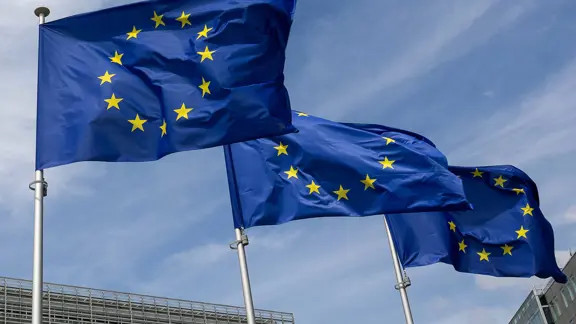News
European Parliament stands with players: Historic vote backs health protections, fundamental player union rights and fair competition

Members of Parliament call for occupational health protections, collective governance, and EU law compliance in professional sport
FIFPRO Europe welcomes the European Parliament's adoption of its report on the European Sport Model with more than 80 percent of the total votes, marking a critical moment for player rights and the future of professional football in Europe. FIFPRO Europe actively contributed to the report's development through participation in parliamentary hearings and written submissions.
FIFPRO Europe, as the sole collective voice of player unions in Europe, extends its sincere thanks to all Members of the European Parliament, the rapporteur, and the Committee on Culture and Education (CULT) for their dedicated work and unwavering commitment to protecting the rights and wellbeing of athletes across Europe.
European Parliament prioritises health and safety
With this report the European Parliament has for the first time explicitly affirmed that occupational health and safety regulations apply to professional athletes. Members of Parliament called for "proactive risk management in developing and overseeing occupational safety and health policies, including factors such as travel, match calendars and overlapping competitions", directly addressing the unprecedented workload crisis facing players today.
"This is a defining moment for player welfare and player rights," said David Terrier, President of FIFPRO Europe. "For too long, players’ health and safety concerns have been sidelined in calendar decisions. The European Parliament has sent a clear call for action: players are workers, and their wellbeing must be protected under the same health standards that protect every other worker in Europe. Match calendars have become unsustainable, and this recognition by Members of the European Parliament shows that asks to protect player health and decision-making rights are not only common sense but also a legal requirement."
European Parliament re-affirms need for collective governance
The Parliament's resolution strongly reinforces principles of collective governance and stakeholder representation in decision-making. The report "welcomes efforts on collective governance, and encourages further steps to strengthen stakeholder representation in decision-making, with a particular commitment to ensuring the involvement of athletes and fans". It further calls on the European Commission to promote social dialogue (collective bargaining) in sport as a key decision-making process.
Application of EU Law to the Sports Sector in Europe
In addition, the European Parliament called on the Commission to "provide clear guidelines on the application of EU law, including competition law, to the sports sector, also in light of recent judgments of the CJEU".
This intervention comes as FIFPRO Europe and European leagues have filed a complaint with the European Commission against FIFA, outlining how FIFA's conflicting roles as governing body and competition organiser create a conflict of interest, with FIFA using its regulatory power to promote commercial interests at the expense of social partners.
Equally the European Parliament has re-confirmed the critical need for the transfer system to comply with EU law following the decisions by the European Court of Justice in the Diarra ruling.
FIFPRO Europe welcomes the clarification by the European Parliament and stresses again that as a significant part of the European economy and its social fabric, player unions will protect and promote fair competition and free movement to operate in compliance with European law, fundamental rights and public regulation.
What’s next
The resolution also addresses numerous other player-centric priorities, including social protection, solidarity, fair allocation of resources, the protection of minors, the regulation of intermediaries, and support for dual careers, lifelong learning, mental health, and post-retirement transitions for athletes.
FIFPRO Europe joins the call for action by the European Parliament and will work with the European Commission, UEFA, the European Club Association (ECA), the European Leagues, and international football stakeholders to act swiftly on the Parliament’s recommendations.
Only through genuine social dialogue and collective bargaining platforms at European and international level can the professional football sector achieve a sustainable, fair, and rights-based future in line with EU law and fundamental workers’ rights.
